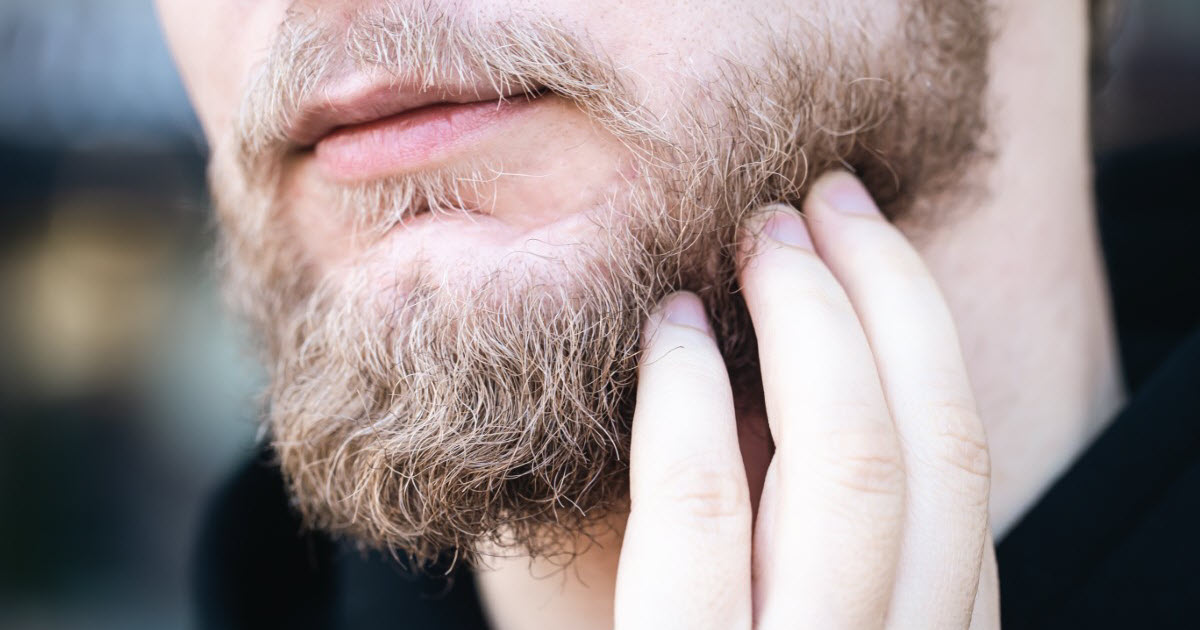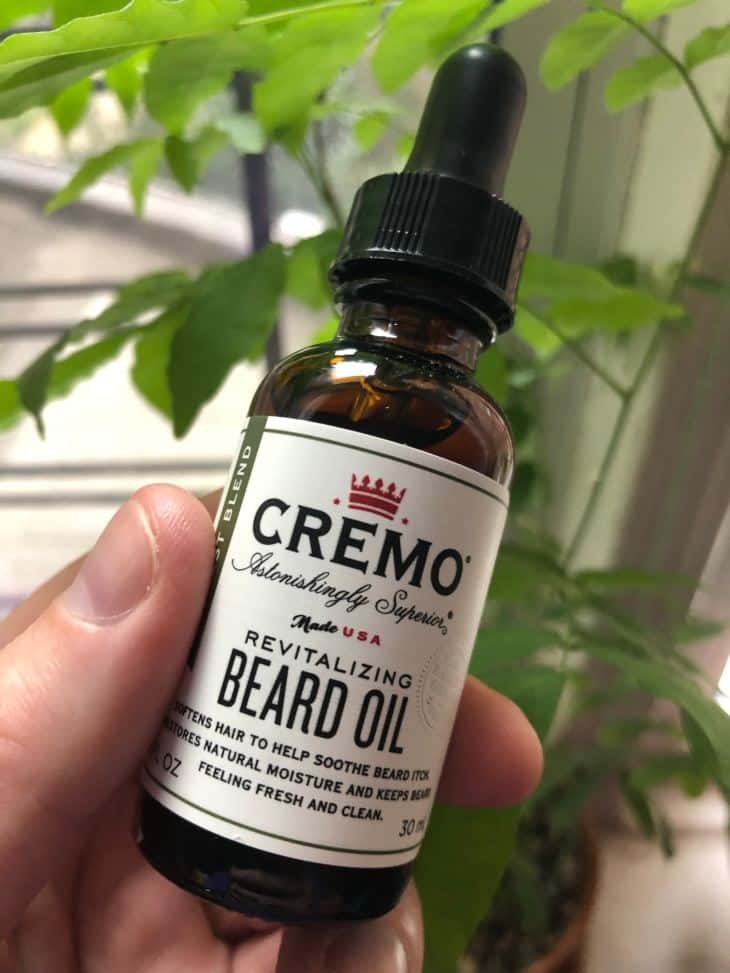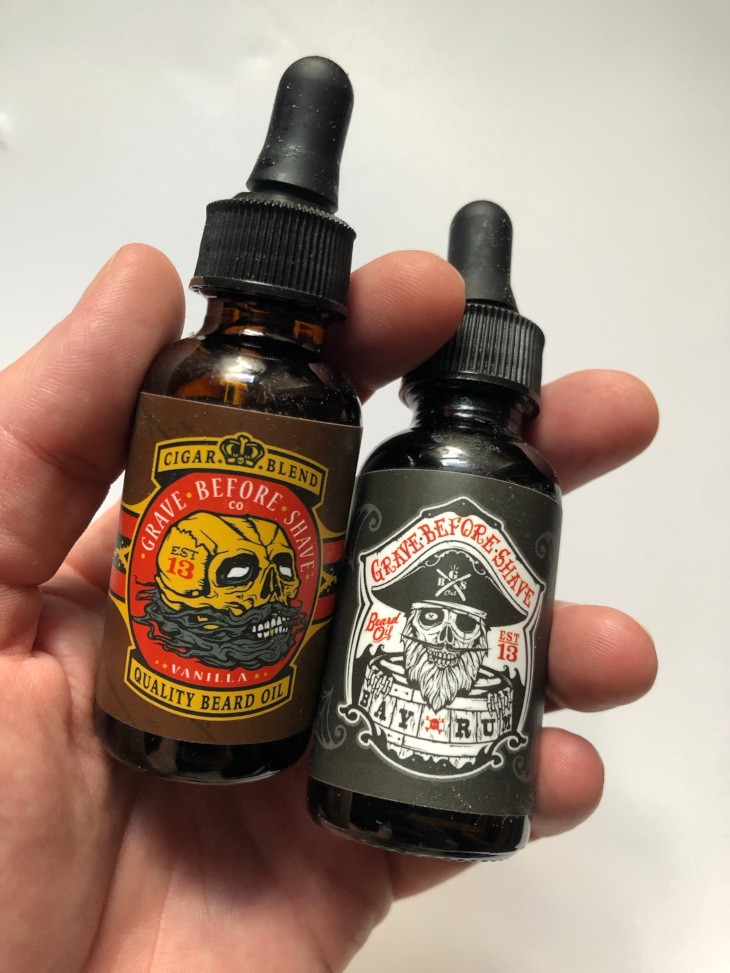A few guys are lucky enough to have full, healthy, thick beards with no effort. For the rest of us, there are beard oils. Unfortunately, the best beard oils can go for more than a hundred dollars. That’s why today we’re sharing some of our favorite
Don’t get us wrong, a high quality, great smelling beard oil can give you great results. But it doesn’t take an expensive oil to make a beard look and feel good.
Some
In fact, if you enjoy DIY’ing your own self-care products, you’ll probably like making your own beard oil from a recipe.
Beard Oil Alternatives You May Already Own
Some of the best budget-friendly beard oils are already in your pantry. Everyday coconut oil or olive oil can give your whiskers a shine they’ve never had before.

If you want to grow a badass beard on a budget, these 10 budget friendly
Here’s a quick list of
- Coconut Oil
- Mineral Oil
- Olive Oil
- Vitamin E Products
- Castor Oil
- Jojoba Oil
- Tea Tree Oil
- Peppermint Oil
- Shea Butter
- Face Cream and/or Conditioner
Now let’s dig into each one of these to help you find the best
Coconut Oil – Good for Everything, Great for Beards
Coconut oil has a ton of different uses. Aside from being a great butter replacement, it’s one of the best

It’s high in lauric acid which absorbs into hair quickly, supplying moisture and taming frizz. It’s also dirt cheap and can be found in huge tubs at your local grocer.
Hair supply stores will also stock different coconut oil blends, but those aren’t always the greatest.
The coconut oils that hair supply stores sell can be tricky. They’re usually loaded with lower-grade filler oils and artificial fragrances.
Most of them won’t make your hair fall out or anything, but there’s no way for you to know their ratios. It’s common for a product with coconuts plastered all over the bottle only to have a small percentage of actual coconut oil.
Even unmixed coconut oils are not created equal. There are two types, refined and unrefined.
Refined coconut oil is run through a clarifying process that removes all remaining plant material. The oil ends up being tasteless, mostly odorless, and clear.
This also removes some of its positive benefits. However, it is cheaper and is less prone to causing breakouts.
Refined vs Unrefined Coconut Oil
Refined coconut oil is best used as a base for something else. Unrefined coconut oil has all the vitamins and healthy fats you’re looking for.
The refined and unrefined varieties look the same, but the unrefined stuff will have a strong, sweet coconut smell that you can’t miss.
There’s one small drawback to coconut oil, though. It’s liquid and clear when warm but solid and flaky when cold.
It also has the color of coconut flesh when it’s hard. Wearing it in cold enough weather may make your beard hairs whitish and stiff.
Mix it with another thinner oil if you don’t want to look like a mall Santa.
Petroleum Oil – Protects Your Beard From Even the Harshest Weather
Petroleum based oils like mineral oil don’t get much love from hair care gurus. Other oils have exotic scents and health benefits while mineral oil is just plain.
However, this simplicity is the exact reason why you shouldn’t overlook it.
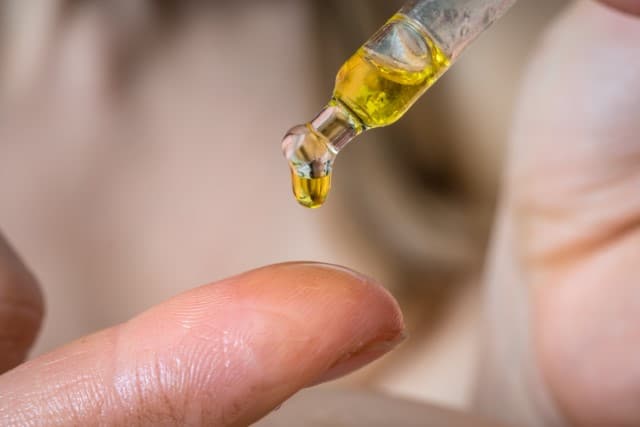
Whether you’re buying baby, mineral, or vaseline, these oils all come thick and heavy. This gives them great staying power in cold, dry weather, when beards need the most protection.
While mineral oil doesn’t have anything in the way of vitamins, it’s fantastic for layering over lighter oils to keep them from evaporating before they’re absorbed.
A word of caution to the acne prone: this stuff will clog your pores in a hurry. A thick layer of mineral oil might as well be plastic wrap.
This is not the best
There’s not many choices to be made when picking out mineral oil. Baby oil and mineral oil are the same, baby oil just has fragrance.
Like coconut oil, any brand with a short ingredient list is perfectly fine. Just make sure it’s labeled “cosmetic grade” as you don’t want to put car lube on your face.
Olive Oil – Liquid Gold Since 69 BC.
Anyone who’s just now hearing about the greatness of pressed olives is about several thousand years late. Cleopatra, Julius Caesar, and other historical icons used olive oil in their beauty routines.
Not much has changed since then. In fact, we’re more obsessed than ever.
Modern science has shown that olive oil contains antioxidants and fatty acids that protect hair.
So much so that the trendiest among us have called it a “superfood”.

As fun as it is to burst people’s bubbles, we just can’t do it this time. Olive oil’s larger than life reputation is well-deserved.
It’s got antioxidants, sun fighting properties, anti-aging properties, and it’s only as expensive as your wallet allows.
Like coconut oil, there are different grades of olive oil. The rules for grading are similar, too.
Refined olive oil is odorless, colorless, and cheap. It won’t hurt your whiskers, but most of the healthy stuff you’re after has been processed out.
Instead, go for the slightly more expensive extra virgin. You should be aware, though, that while purer oils have more of the healthy ingredients, they also have a stronger scent.
Go too high grade and you’ll end up with an excessively shiny beard that smells like an Italian restaurant. You can fix this problem by mixing it with a nicer smelling oil, though.
Vitamin E – AKA The Hair Growth Vitamin
Vitamin E oil is in just about every cosmetic you’ve ever used. While the stuff is full of antioxidants, the real reason you see it so often is because it’s a powerful preservative.
If you’ve ever wondered why store bought beard oils last way longer than your homebrews, vitamin E is the key. Luckily for us, vitamin E oil confers its preservative properties to human hair and skin as well.

Unlike other oils, vitamin E is cheapest in its purest form. Your local drugstore stocks vitamin E capsules that you can pop open and slather right on your beard.
Using vitamin E by itself is fine. However, it can be thick and gets sticky as it dries.
That is why we advise mixing it with another oil with a smoother texture, such as jojoba or olive oil.
Swirling it into your favorite face cream is another easy DIY option.
A quick Google search for vitamin E
Remember, manufacturers are required to list the ingredients in the order of prevalence. Ideally you’d want vitamin E within the first five or so ingredients.
Whether you choose to use vitamin E on your beard or not, you should definitely be getting your daily dose. It’s crucial to a full, thick beard.
Castor Oil – Grows and Longer, Darker, Fuller Beard for Under $10
Do you already have some castor oil in your medicine cabinet? You’ll be happy to know it has cosmetic benefits too, especially when it comes to your beard.
The star ingredient for us beard lovers is definitely ricinoleic acid, a fatty acid that promotes blood flow to the scalp.
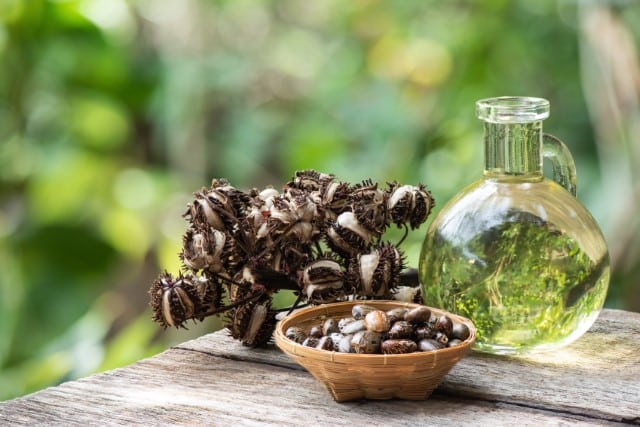
Castor oil comes in two varieties, yellow and black. The black is sometimes called “Jamaican” black castor oil, but both are made from the same castor bean.
Yellow castor oil is cold-pressed and is subject to less processing than black. While this technically means it’s the purer form, black castor oil’s processing gives it additional benefits.
Black castor oil comes from castor beans that have been roasted. This roasting gives the end product its dark look and adds the compounds that increase hair growth.
It won’t make you grow a beard out of a baby face, but it will help with filling out some thin spots.
Castor oil is definitely on the heavier side. It also has a noticeable scent that some people might not like.
Luckily, it mixes well and serves as a great base for essential oils.
Jojoba Oil – A Super-Mild Oil for Everyday Use
Jojoba “oil” is kind of a misnomer. Due to its unique makeup, jojoba oil is closer to a liquid wax.
As a result, it can last a very long time. This could be up to around five years, in the right conditions.
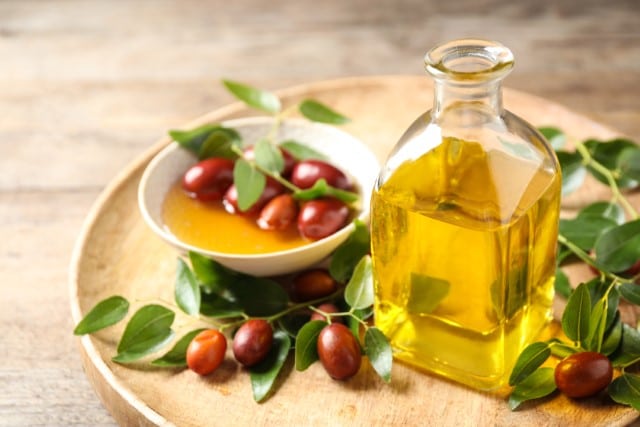
The fact that it’s a humectant makes jojoba oil so popular.
This means that it’s like mineral oil in that it preserves existing moisture. However, unlike mineral oil, it’s very close to the oil we make naturally. It’s light enough to sink into your pores.
If there’s any oil on this list that makes for a good one and done hair and face care routine, jojoba oil is it.
It has wrinkle and acne fighting compounds as well as its hair care benefits.
In short, there’s nothing bad to say about jojoba oil. This stuff is great.
Tea Tree Oil – Kiss Acne and Flaking Goodbye
Tea tree oil has a strong smell with a medicinal quality. It’s not expensive but you might have to put in some work to find what’s right for you.

If you’re looking to keep things simple, look for a pre-made blend.
Finding pure tea tree oil online to DIY a mix is easy. Be sure that the product label says pharmaceutical or cosmetic grade.
But beware, mixing your own tea tree
It will absolutely burn your face and dry out your beard if you use too much. However, if you use the right amount, tea tree oil is the go-to ingredient for fighting many kinds of skin irritation, as well as acne and dandruff.
Peppermint Oil – A Fresh Beard
While not as strong as tea tree oil, peppermint oil has significant antibacterial properties. It tingles when you put it on, too.
Of course, peppermint is best known for its signature fresh scent.
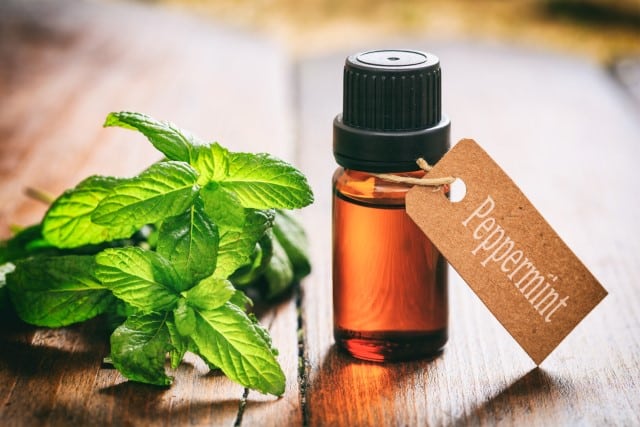
It’s also got some benefits of its own, including helping hair grow a little faster. Also like tea tree oil, it won’t feel very good if you use a lot.
A drop or three in a whole bottle of oil is plenty.
Like other kinds of essential oils, make sure that you only use therapeutic or cosmetic grade peppermint oil only. Stick to pre-made mixes if you’re not confident in your DIY skills.
Shea Butter – Super Nourishing, Just a Dab Will Do
Shea butter is a fatty, rich oil that’s solid at room temperature. It bathes the skin and hair in vitamins A, E, and F, protecting them from damage.
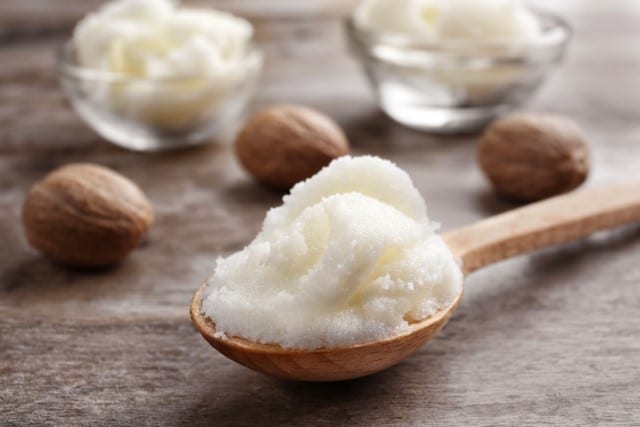
The fact that it’s solid at room temperature also means that you’ll get some hold out of it in cooler weather. It doesn’t dry white either, so no coconut oil frost-moustache.
The velvety feel may make you want to slather it on but in this case less is more. Shea butter can get greasy fast and doesn’t dry quickly. It’s good at trapping moisture like mineral oil but isn’t quite as heavy.
Shea butter works best for those with curly or coarse hair that struggles to retain moisture. If it’s too heavy for you, just melt it and dilute it with a lighter oil like jojoba.
Face Cream and Conditioner – You’ve Got it Already, So Why Not?
Most hair conditioners have all sorts of vitamins added to them. These compounds are pretty much the same ones that you’d be looking for in an oil.
Who said that those vitamins and hair protecting fats are only useful in the shower?
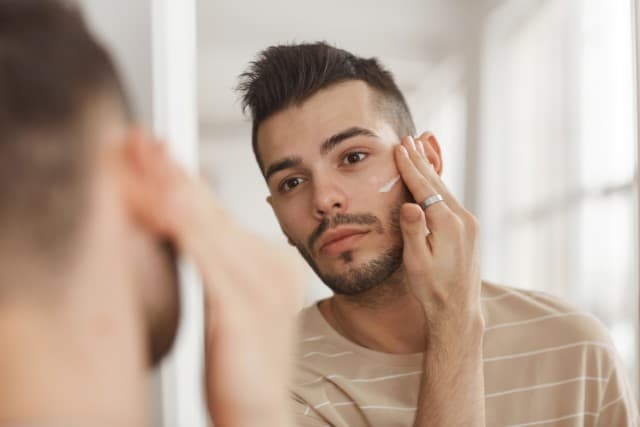
Here’s a lifehack. Leave-in conditioner is just conditioner that’s been watered down enough to not saturate the hair.
This means that a little conditioner and water in a spray bottle could be all your beard needs. The trick is getting the balance right and understanding that the balance changes depending on what you use.
You’ll have to do some trial and error for yourself.
Like hair conditioners, face creams already come with a lot of what you’re looking for. Many face creams come with salicylic acid, which is an insanely effective ingrown hair cure.
Combine that with tea tree or peppermint for baby smooth skin that’s totally flake free.
Save Cash By Making Your Own Mix!
Mixing your own beard oil isn’t hard. Start with your favorite neutral oil like coconut or olive. The rest is up to you.
A few drops of tea tree oil will fix itching, or use vitamin e if your hairs are dehydrated. Shea butter protects in cold months, while jojoba is light enough to wear on the hottest summer day.
The best beard oil for you depends on the problems you want to solve.
Luckily, every
Michael Morris is the head writer here at Rough and Tumble Gentleman. He's got a ducktail beard and loves Brazilian jiu-jitsu. He's married to the woman of his dreams and lives in Brooklyn, NY.

